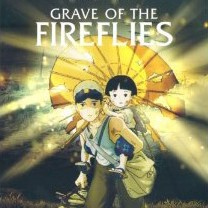 Regularly lauded as the best anime of all time, Grave of the Fireflies (Hotaro no Haka) now has a UK region “special edition” DVD release. US film critic Roger Ebert has said that this film belongs on any list of top war movies and others have compared its emotional impact to Spielberg’s Shindler’s List.
Regularly lauded as the best anime of all time, Grave of the Fireflies (Hotaro no Haka) now has a UK region “special edition” DVD release. US film critic Roger Ebert has said that this film belongs on any list of top war movies and others have compared its emotional impact to Spielberg’s Shindler’s List.
Most films, bearing such heavy praises, would crumble under the weight of increased expectations. Does Grave of the Fireflies survive the hype?
Absolutely. Not only does it survive, it thrives.
One of the most heartbreaking movies ever, Grave of the Fireflies is unbearably sad – parts are almost too painful to watch.
Set in the dying days of World War Two, Grave of the Fireflies tells the story of a teenage boy, Seita, and his baby sister Setsuko. They live in Kobe and, as their story begins they are caught in the middle of an air raid. American bombers are dropping incendiary bombs on their home. The bombs flutter to earth with a strange beauty, but the damage they do is very real, and almost at once Seita and Setsuko are homeless and orphaned – their mother horribly burned by the bombing and their father, a sailor in the Imperial Japanese fleet, is lost at sea.
Seita struggles to look after his sister, while all the time refusing to do his “duty” and work for the war effort. They move in with their aunt, but she quickly sees them as nothing but a burden, begins to cheat them of their food and as things get tougher, she forces them out of her home. They find a brief respite in a deserted bomb shelter, building a kind of idyll, but as the bombing gets worse and food gets harder to find, Setsuko becomes sick and Seita is forced to try and steal to provide for her.
We know Seita’s fate from the beginning – the film is presented as a series of flashbacks introduced by the boy’s ghost – though we hope, against hope, that he will find safety for Setsuko.
If you labour under the misapprehension that animated films are only for kids, Grave of the Fireflies will come as a shock. This may be the most assuredly adult and lyrical anti-war statement ever committed to screen. Director Takahata makes plain the suffering of the children but it never descends into bitterness. This is a film without hatred, though hatred would be understandable, but it is certainly not without passion. The emotions it stirs – pity, compassion, fear, desperation – are all too real, indeed they are almost too much. The film is, in places, so affecting, so painful, that it is hard to keep staring at the screen.
As a war film it is a curious creation, for the violence flashes past in moments but, as in real life, the repercussions are lasting. In a strange way the bombings are beautiful – seen at a distance the falling firebombs echo the fireflies that surround Setsuko, fluttering upwards on their way to the heavens, at every turn. Grave of the Fireflies is relatively short but it moves slowly, lingering over images of nature even as the world is being destroyed.
The final scene, in which the ghosts of the children look out over modern Japan reduced me to blubbering sobs. Grave of the Fireflies is not a film to watch if you are trying to maintain a veneer of thick-skinned manhood.
Based on a semi-autobiographical novel by Nosaka Akiyuki – who lived through these events and lost his sister to starvation – it hardly seems an obvious choice as the subject of an animated movie. Even stranger that it should come from Studio Ghibli – perhaps best known for Hidao Miyazaki’s considerably lighter films (Spirited Away and Princess Mononoke).
But, whatever the source, this is a powerful, moving, intelligent film. Not the sort of animated movie you’d want to sit down and watch with children, and probably totally bewildering for those who prefer their Japanese animation packed with giant robots, but still a truly great movie. Sadly the extras on this “special edition” aren’t worth the space, but if you don’t own this film or worse, if you haven’t already seen it, buy it now.
Grave of the Fireflies not only survives the hype, it is a rare film that surpasses expectations. It isn’t easy to watch, but it rewards every second. It is magnificent.
